Claremont 100 years ago this month: the more things change, the more they stay the same

Claremont had three dairies in 1924, and according to this Courier ad, customers could either order delivery or simply stop their delivery trucks on the street to purchase milk. Photos/courtesy of Claremont Heritage
By John Neiuber | Special to the Courier
The Claremont Courier has been chronicling the culture of Claremont for going on 117 years, and I am fortunate to have been granted access to the newspaper’s archives.
In 2022, when I was researching the 100th anniversary of the Claremont Chamber of Commerce for this column — which turned out to actually be its 114th anniversary — I also had the privilege of reading the minutes of the chamber from 1920 to the present. Having access to both has been eye-opening and has provided a certain perspective that justifies the old adage, “The more things change the more they stay the same.”
Over the history of the city, every change to the local economy, whether it be an economic driver like the citrus industry, or the even the loss of a small beloved business, has been bemoaned as the “end of Claremont.” But it was not. It was replaced by a new economic driver and a new business, that later was again bemoaned as the “end of Claremont” when it was lost. Even the business merchants were dead set against calling what was once known as the “central business district,” the Village, which was a marketing campaign by the Claremont Chamber of Commerce. But today it is the Village, and most think it has always been called that.
And don’t even get me started on parking. Parking has been an issue in the central business district, er, I mean the Village, since there was a business district. However, as one Claremont business leader often says, “The Village doesn’t have a parking problem, it has a walking problem,” pointing to the fact that we all want to park right in front of the business we are visiting, but there is a parking place within a couple of blocks. Oh, the humanity!
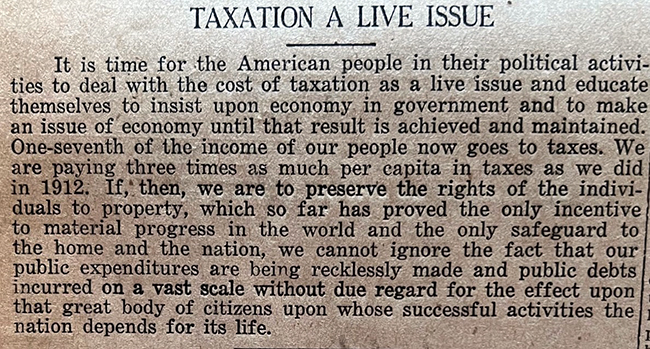
Taxes were an issue 100 years ago just as they are today, as evidenced by this 1924 Courier editorial.
Speaking of parking, one would have needed a car back in 1924 for that to be a problem, although horses and carriages still shared the road, and also needed to be parked. In December of 1924, Roy Hinchcliff Claremont Ford ran an ad in the Courier announcing the Ford Motor Company was lowering prices effective December 2. A reduction of $25 on the Fordor Sedan reduced the price to $660. The least expensive model, the Runabout, was even lower at $260.
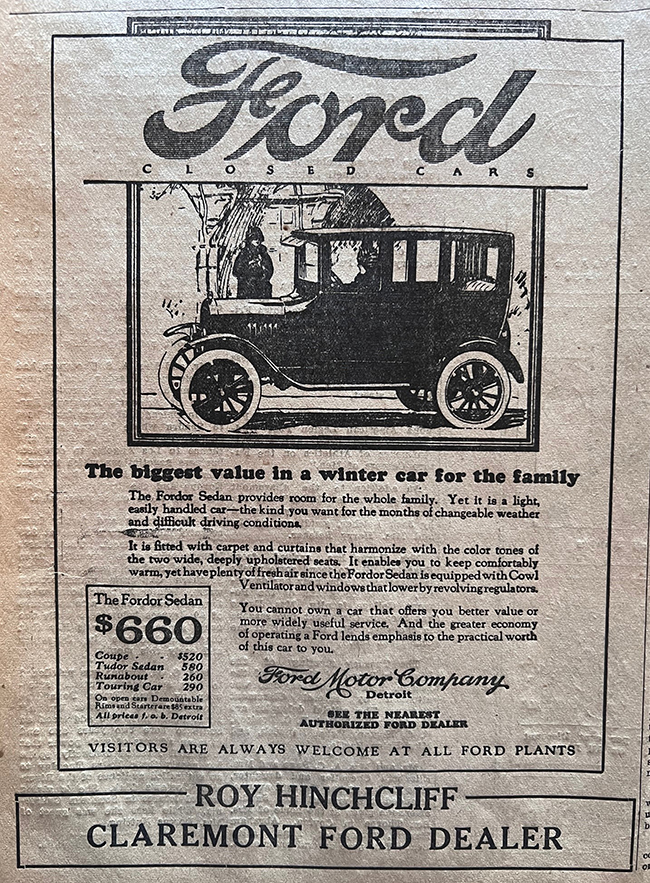
This 1924 Courier ad for Claremont’s Roy Hinchcliff Ford dealership touted carpets, curtains and “deeply upholstered seats” in the Fordor Sedan.
At a city trustees’ meeting, city recorder G.M. Gardner reported Claremont collected $211 in traffic fines during November. City street superintendent J.S. Holabird’s report stated that total street work expensed for the month was $1,081.34, with the largest expense going for improvements to Alexander Avenue (now Indian Hill Boulevard) at $286.50. City treasurer H.E. Mead noted a balance in the general fund of $6,422.53 at the beginning of the month.
The Kiwanis Club, which just celebrated its 100th anniversary in 2024, reelected all its present officers going into its second year of existence. Homer Robbins, who would later serve as mayor of Claremont, was elected trustee, and Mayor Powell was elected as sergeant-at-arms.
Duvall’s College Book & Drug Store announced in their ad that they had on display some “Very Fine Greeting Cards,” and alerted their customers, “Any books which you want for Christmas Gifts and which we do not have on our shelves should be ordered now.”
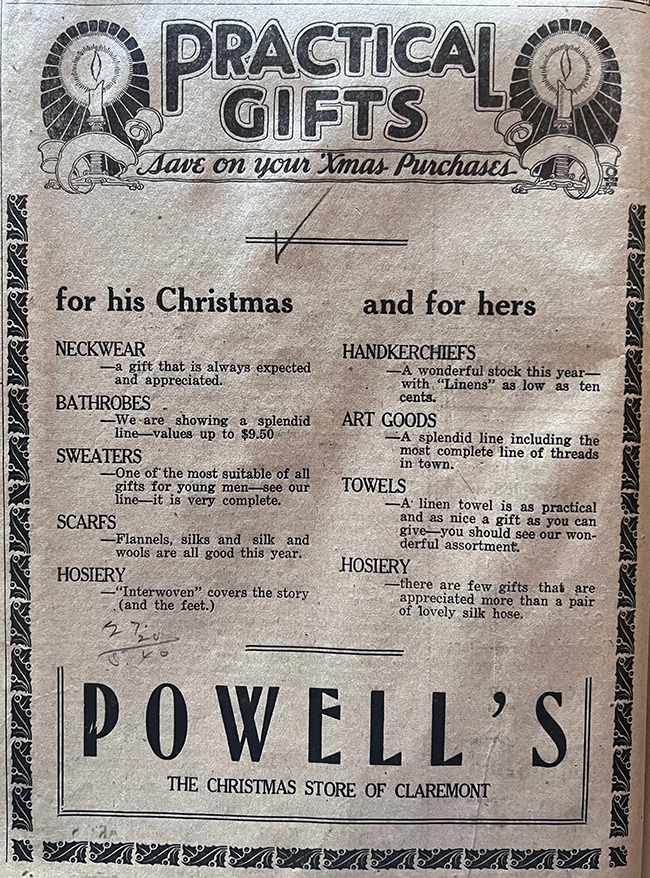
Before Powells became a hardware store it was a general store located on First Street, advertising itself in the Courier as “The Christmas Store of Claremont” in 1924.
The ongoing feature in the newspaper, the “Chamber of Commerce Notes,” was reported by then secretary (executive director or CEO today) Lela Ackerman. She wrote that a gift of $300 was made by an anonymous donor to help the chamber in planning city development.
Lewis, The Jeweler, located on First Street, ran an ad about the useful gifts that were carried in the store: bud vases, sugar tongs, salt and pepper shakers, baby spoons and forks, and napkin clips, which were all in stock for Christmas.
The headline of another lead article proclaimed, “Lemon Growers Now Receiving Large Returns.” “With lemons returning $2 a field box for the past six weeks as compared with such payments as 10 cents per box in the spring and early summer, owners of the 600 acres of lemons who ship through the College Heights Lemon Association, are again valuing their groves at a normal price,” read the story.
The Fox-Woodsum Lumber Company of Claremont touted the benefits of a shingle roof for the new homes being built. F.H. Holmes, manager of the company, offered free plan service. Local dairies advertised their products and published a telephone number to call for delivery, or one could simply stop the milk truck on the street. Wolfe & Company stated in their ad that in the previous week “23 articles in the grocery line advanced in price — while 3 declined.”
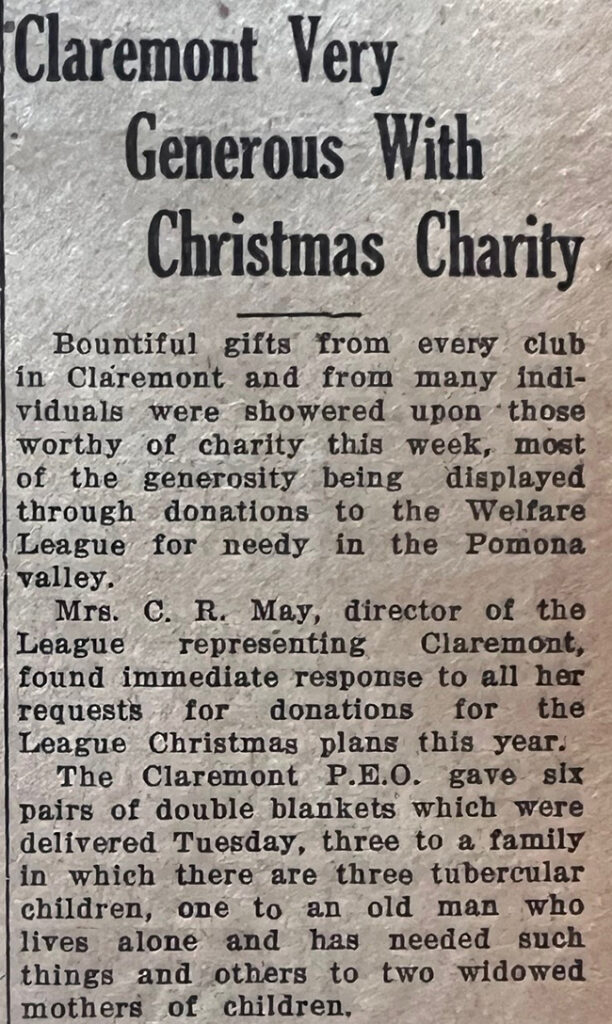
This Courier article from December 25, 1924 celebrated Claremont’s spirit of giving.
And in the spirit of giving, a 1924 Courier headline stated, “Claremont Very Generous With Christmas Charity,” highlighting something that is still true today, bringing us full circle to “the more things change the more they stay the same.”






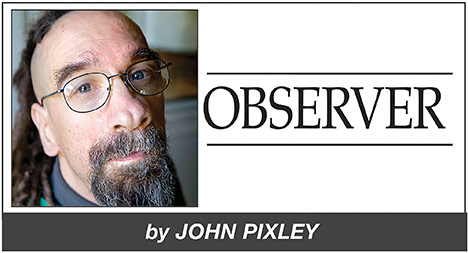


0 Comments